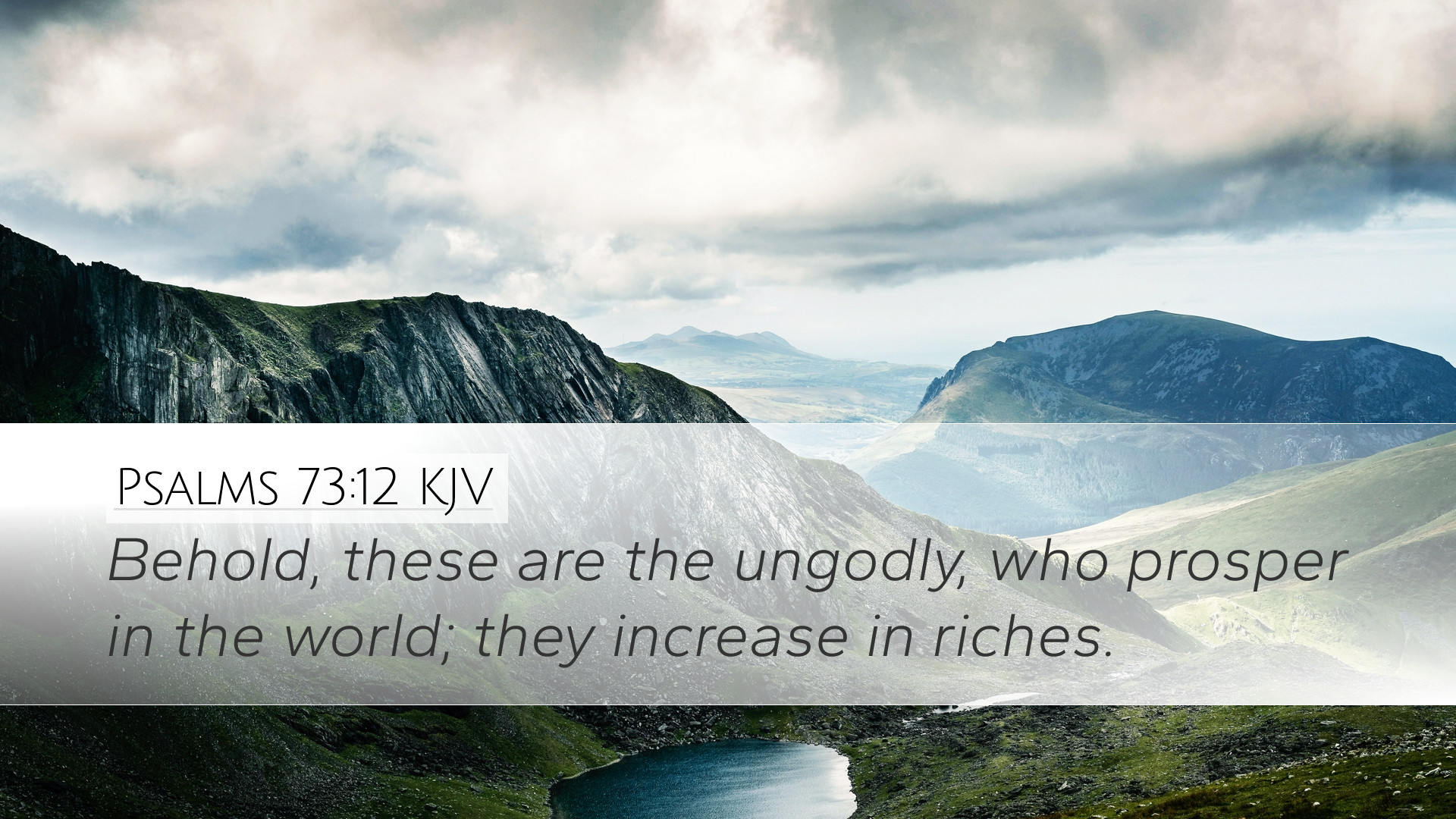Commentary on Psalms 73:12
Psalms 73:12 states, "Behold, these are the ungodly, who prosper in the world; they increase in riches." This verse presents a striking observation that often perplexes the faithful: the prosperity of the wicked. Various commentaries shed light on the implications and theological reflections of this verse, as follows:
General Overview
The entire Psalm 73 deals with the psalmist's inner turmoil regarding the apparent success of the wicked. In this verse, the psalmist is acknowledging a troubling reality; despite the moral decay and ungodliness that these individuals represent, they seem to thrive. This creates a poignant tension between faith and evidence, one that resonates with believers throughout the ages.
Insights from Matthew Henry
Matthew Henry, a notable Biblical commentator, interprets this verse by first listing some observable truths about the ungodly. He emphasizes that:
- Prosperity of the Wicked: Henry notes that the apparent success of the ungodly can lead to a misguided notion that righteousness does not yield reward. This raises questions about divine justice.
- Focus on External Circumstances: The commentator points out the tendency to take this external prosperity at face value without recognizing the spiritual ramifications and ultimate fates of the unrighteous.
- Encouragement for the Righteous: By discerning the end of the ungodly, believers can find comfort in their faithful obedience, as prosperity is not a guaranteed assurance of divine favor.
Insights from Albert Barnes
Albert Barnes, known for his analytical approach to scripture, further elaborates on the nuances of this verse:
- Temporary Success: Barnes suggests that the wealth and success enjoyed by the ungodly are often transient, serving a greater divine purpose that may not be evident in the immediate context.
- Divine Perspective: He highlights that the prosperity of the wicked is often a test for the righteous, calling them to a deeper understanding of God’s justice.
- Warning against Envy: The verse serves as a caution to the believers, urging them not to envy those who flourish outside of God’s will, for their end is destruction.
Insights from Adam Clarke
Adam Clarke offers rich theological insights and contextual understanding regarding Psalms 73:12:
- Nature of Prosperity: Clarke emphasizes that the prosperity of the ungodly can be attributed to their disregard for moral and divine standards. This sanctifies the notion that true prosperity is measured not in material wealth but in spiritual integrity.
- Role of Faith: He reinforces the idea that faith should not be swayed by the visible successes around us. Rather, believers should anchor themselves in the eternal promises of God.
- Ultimate Justice: Clarke concludes that God's ultimate justice cannot be measured by earthly outcomes, reiterating that judgment for the wicked will come in due time.
Theological Implications
This verse invites a broader discussion on the theological themes of justice, prosperity, and belief. The apparent dilemma of the ungodly's success juxtaposed with the suffering of the righteous can lead to profound considerations such as:
- The Sovereignty of God: Believers must remember that God is sovereign over all circumstances, including the prosperity of those who do not follow Him.
- Faith in Trials: Even amidst seeming injustice, faith is paramount. The psalmist’s reflections remind the faithful of the importance of persevering trust in God’s character.
- Eternal Perspective: To understand the struggles of the earthly life through the lens of eternity is crucial. The ultimate fate of the ungodly is far removed from their temporary successes.
Practical Applications
Pastors, students, and theologians can draw several practical applications from Psalms 73:12:
- Encouragement to Believers: Remind congregants and colleagues that temporal success does not equate to divine approval. Encourage steadfastness in faith.
- Preaching on Justice: Utilize this verse in discussions on God’s justice, enlightening listeners that seasons of trouble do not negate God’s presence or plans.
- Addressing Doubt: Create open conversations about doubts and frustrations regarding faith, allowing the community to process their feelings in light of scripture.
Conclusion
Psalms 73:12 provides a vivid exploration of the tension between righteousness and the seemingly unmerited success of the wicked. Through the insights of historical commentaries from Matthew Henry, Albert Barnes, and Adam Clarke, we see a shared understanding: while earthly prosperity may appear to favor the unrighteous, true wealth lies in faithfulness to God. This passage serves as a profound reminder to believers to maintain a heavenly perspective amidst the trials and tribulations of life, ensuring that their faith remains steadfast.


